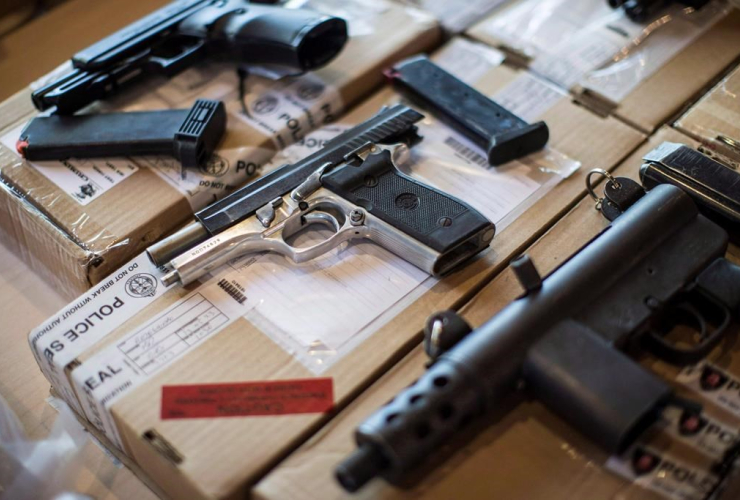Update: Toronto police say Faisal Hussain was able to obtain firearms through a U.S. source, and that a search of his apartment revealed he had an assault rifle along with ammunition.
After Toronto police reported that 29-year-old Faisal Hussain from Thorncliffe Park in Toronto was responsible for the shooting on Sunday that killed two (three including Hussain) and injured 16, the shooter's family released a statement highlighting his mental health problems. And on social media, many people were asking, how someone with a history of mental illness was able to get a handgun. It is a question left unanswered in the wake of so many shootings, from Parkland to Danforth, a gap with tragic ramifications.
"This is being considered as part of our ongoing investigation. At this stage, we are not prepared to release this information," said Toronto police information and issues management section head Meaghan Gray in an email to National Observer on Tuesday.
The Hussein family had said in a statement on Monday that their son had in fact been dealing with "severe mental health challenges, struggling with psychosis and depression his entire life."
"The interventions of professionals were unsuccessful," the statement said. "Medications and therapy were unable to treat him. While we did our best to seek help for him throughout his life of struggle and pain, we could never imagine that this would be his devastating and destructive end. Our hearts are in pieces for the victims and for our city as we all come to grips with this terrible tragedy.
One of his neighbours in Thorncliffe Park expressed shock over the news, saying Hussain was a "good kid" who stayed out of trouble. People who knew Hussain reported that he had a job in retail at Shoppers Drug Mart, and that he had a twin brother who has been in a coma since getting into an accident over a year ago.
"Faisal, right?" a neighbour of the Hussain family says in a video tweeted by cameraman Tony Fera. "He’s a working kid. He’s not like the kids standing behind this building smoking weed or carrying a knife or gun. He’s not like that. He’s a nice kid. It’s unbelievable."
Neighbour Khalid can’t believe that Faisal Hussain is capable of destruction like the #DanforthShooting. @CityNews @680NEWS pic.twitter.com/RXCCm5vshB
— Tony Fera (@tonyfera1) July 23, 2018
After information emerged about Hussain's years-long struggle with mental illness, people began asking why he was able to obtain a firearm.
@TorontosMayor @RalphGoodale How did Faisal Hussain, reportedly suffering from psychosis, get a gun, ammo & training? Who and what were checks & balances that should have prevented his access to a firearm? How do we keep #danforthshooting from happening again? Answers please.
— varun madhok (@Varun_Madhok) July 24, 2018
The New York Times reports that, according to the Canadian Association of Chiefs of Police, from 2013 to 2016, criminal incidents related to guns jumped 30 percent, while gun homicides increased by more than 60 percent. Although some handguns are smuggled across the border from the United States, Mario Harel, president of Canadian Association of Chiefs of Police, told a legislative committee in May that “50 percent of all handguns used in crime, that we have been able to trace, have been diverted from legal Canadian firearm owners.”
In Canada, gun ownership requires background checks that go five years into an applicant's past to look for any criminal convictions, mental illness associated with violence or a history of violence and threats. Hussain was said to have no criminal record, but had a history of mental health concerns dating back to 2010.
Toronto mayor John Tory said he has spoken repeatedly about Toronto's gun problem, and brought it up with the federal government. He also questioned why anyone in Toronto would need a gun, prompting reactions from gun advocates arguing that the mayor was improperly blaming guns rather than their users.
Toronto Mayor @JohnTory asks city council: "Why does anyone in Toronto need a gun?"
— Global News Toronto (@globalnewsto) July 23, 2018
MORE: https://t.co/Hrpo0hLLKx pic.twitter.com/PqyQRXHkgo
A gun store representative in the Toronto area, who declined to be named, saying it was too "volatile a time," told National Observer that it is unlikely a person with documented mental health issues such as Faisal Hussain could have bought a firearm legally.
"Generally speaking, a person with documented mental health issues would not be issued a license," he said. "That would be discovered during the background check." The RCMP's background check involves two character references, he said, and issues such as psychosis would have been caught in the process. In his view, tightening regulations around legal gun purchases wouldn't help because a mass shooting would more likely involve an illegally purchased gun. Although illegal firearms in Canada have historically been smuggled from the U.S., police say there is now a surge of guns being obtained legally in Canada and later sold illegally.
But a large number of Canadians support tight gun laws. According to a December 2017 Ekos Research Associates poll for the Canadian Press, 69 per cent of those surveyed agreed with the statement "I think that there should be a strict ban on guns in urban areas."
Most Canadians back total ban on guns in urban areas, poll suggests /via @globeandmail https://t.co/MLsGEjtg3J
— Frank Graves (@VoiceOfFranky) July 23, 2018
We will be updating this piece as more information is available. Please see related stories below for more information about gun laws, gun ownership and values about gun control in Canada and the U.S.





Comments